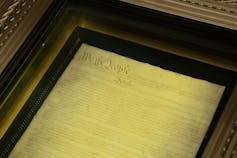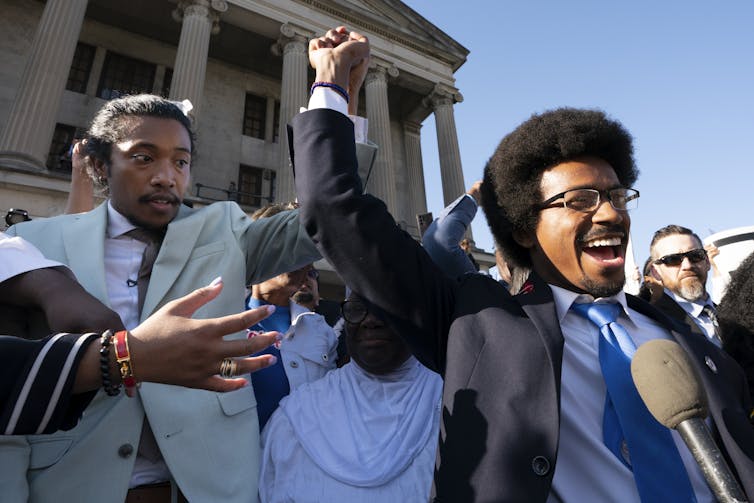
U.S. President Joe Biden has launched his re-election campaign, and we can expect to hear a lot about the need to protect American democracy from the Donald Trump-led Republicans.
Now that the former president has been held liable for sexually assaulting and defaming columnist E. Jean Carroll, we might also hear about the need to uphold the rule of law and basic standards of human decency.
But neither Biden nor the progressives who support him say much about protecting the U.S. Constitution. This is perhaps because they fear that the nation’s charter, written in 1787 by 55 elite white men who wanted to curb an “excess of democracy,” wasn’t designed with them in mind.

Frustrated by the document’s anti-majoritarian elements, including the Electoral College and the Senate, American progressives tend to cede the constitutional ground to their opponents, who eagerly turn the lines they like into holy writ.
This is why we hear so much about the second phrase of the Second Amendment — “ … the right of the people to keep and bear Arms, shall not be infringed.”
But for all its limitations, the constitution remains the supreme law of the land in America, the one document that can guarantee the rights and liberties that Democrats correctly see as under threat from Republican extremism.
As such, they need to rediscover its pro-democratic dimensions so they can work with the document — and make it work for them.
General welfare, equal protection
The progressive parts of the U.S. Constitution begin in the preamble, which says that one of its core purposes is to “promote the general welfare” as opposed to private interests.
This idea anchors many of the landmarks of U.S. history — the full name for the Social Security Act of 1935, for example, was “an act to provide for the general welfare by establishing a system of federal old-age benefits.”
Other key sections come from what are known as the Reconstruction amendments (the 13th, 14th and 15th) that emerged from the blood and ashes of the Civil War. They were aimed at building a national citizenship based on “the equal protection of the laws,” and they prohibited the states from denying that protection to any American.
The Voting Rights Act of 1965, officially “an act to enforce the 15th Amendment to the Constitution,” is the best example of the power to bend the arc of history towards justice.

Taken together, the U.S. Constitution’s general welfare and equal protection clauses enable what founding father John Adams called “a more equal liberty” to advance, however unevenly, throughout American history.
These rules also rebuke ongoing efforts by Republicans to demolish Medicaid, a direct descendant of Social Security, and to deny pregnant women and transgender youth access to health care.
The 14th Amendment also requires the U.S. government to pay its debts, undermining Republican threats to force a catastrophic national default this summer.
Guaranteeing democracy
Another part of the constitution, this one in the body of the text rather than the preamble or amendments, prohibits the current drive by Republican-dominated state legislatures in Florida, Tennessee and elsewhere to install one-party rule.
“The United States shall guarantee to every State in this Union a Republican Form of Government,” reads Article IV, Section 4, “and shall protect each of them against Invasion; and on Application of the Legislature, or of the Executive (when the Legislature cannot be convened) against domestic Violence.”
Quietly assumed for much of American history, the first line of this so-called guarantee clause became an issue in the early 1900s, when corporations used it to oppose popular reforms like citizen referendums. They did so by arguing a “Republican” government could not be too democratic, only to find that the U.S. Supreme Court refused to consider such “purely political” questions.
Today’s progressives should use the same clause for the opposite purpose. That is, they should insist that the “Republican Government” guaranteed by the U.S. Constitution requires basic democratic standards that several GOP-dominated states no longer meet.

Even by the criteria of ultra-conservative constitutional “originalists,” this argument is straightforward, because the meaning of “a Republican Form of Government” was self-evident in 1787.
All of the founding fathers and everyone around them knew that such governments were based on popular representation rather than hereditary, military or theocratic rule. They agreed that republics drew their authority from “we the people,” who made their choices known in periodic elections.
Voting rights
Citing the guarantee clause, Democrats at the federal level could therefore press states to democratize voting districts and expand voting sites.
If Congress passed a law to that effect, Biden might even consider using an executive order not just to promote voting rights, but to ensure all citizens have a reasonable chance to vote, even if that means sending the National Guard to polling sites.
After all, Article VI of the constitution makes clear that federal law overrules state laws when the two conflict.
If the Democrats embrace and deploy the constitution this way, it would amplify their case in 2024. It would enable them to offer a confident and coherent message, based on the hallowed principles of America’s founding charter, against the increasingly dark and destructive vision of the Trump-dominated GOP.
Jason Opal receives funding from the Social Sciences and Humanities Research Council of Canada. He is affiliated with Global Action on Gun Violence.
This article was originally published on The Conversation. Read the original article.







